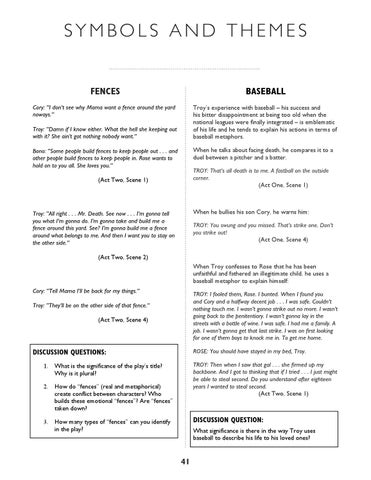S Y M B O L S A N D T H EMES FENCES
Baseball
Cory: “I don’t see why Mama want a fence around the yard noways.”
Troy’s experience with baseball – his success and his bitter disappointment at being too old when the national leagues were finally integrated – is emblematic of his life and he tends to explain his actions in terms of baseball metaphors.
Troy: “Damn if I know either. What the hell she keeping out with it? She ain’t got nothing nobody want.”
When he talks about facing death, he compares it to a duel between a pitcher and a batter.
Bono: “Some people build fences to keep people out . . . and other people build fences to keep people in. Rose wants to hold on to you all. She loves you.”
TROY: That’s all death is to me. A fastball on the outside corner. (Act One, Scene 1)
(Act Two, Scene 1)
When he bullies his son Cory, he warns him:
Troy: “All right . . . Mr. Death. See now . . . I’m gonna tell you what I’m gonna do. I’m gonna take and build me a fence around this yard. See? I’m gonna build me a fence around what belongs to me. And then I want you to stay on the other side.”
TROY: You swung and you missed. That’s strike one. Don’t you strike out! (Act One, Scene 4)
(Act Two, Scene 2) When Troy confesses to Rose that he has been unfaithful and fathered an illegitimate child, he uses a baseball metaphor to explain himself:
Cory: “Tell Mama I’ll be back for my things.”
TROY: I fooled them, Rose. I bunted. When I found you and Cory and a halfway decent job . . . I was safe. Couldn’t nothing touch me. I wasn’t gonna strike out no more. I wasn’t going back to the penitentiary. I wasn’t gonna lay in the streets with a bottle of wine. I was safe. I had me a family. A job. I wasn’t gonna get that last strike. I was on first looking for one of them boys to knock me in. To get me home.
Troy: “They’ll be on the other side of that fence.”
(Act Two, Scene 4)
ROSE: You should have stayed in my bed, Troy.
Discussion Questions:
TROY: Then when I saw that gal . . . she firmed up my backbone. And I got to thinking that if I tried . . . I just might be able to steal second. Do you understand after eighteen years I wanted to steal second. (Act Two, Scene 1)
1. What is the significance of the play’s title? Why is it plural? 2. How do “fences” (real and metaphorical) create conflict between characters? Who builds these emotional “fences”? Are “fences” taken down?
Discussion Question:
3. How many types of “fences” can you identify in the play?
What significance is there in the way Troy uses baseball to describe his life to his loved ones?
41
